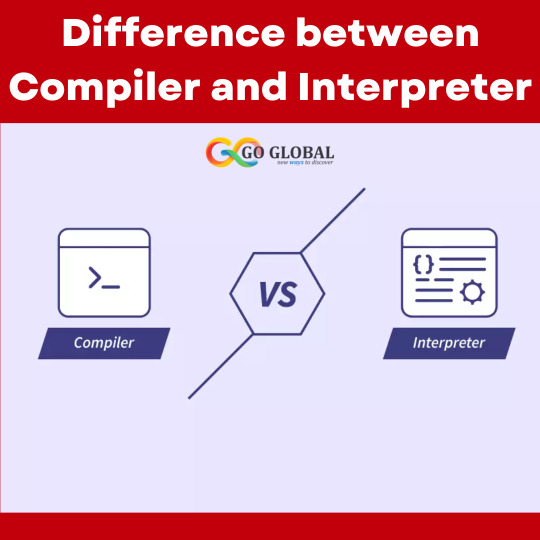#CompilerVsInterpreter
Explore tagged Tumblr posts
Text
Difference between Compiler and Interpreter

Understanding the difference between compiler and interpreter is crucial in the world of programming. Both tools are used to translate code written in high-level programming languages into machine code, but they operate differently.
A compiler translates the entire source code of a program into machine code before execution. This process creates an executable file, allowing the program to run multiple times without needing recompilation. Compiled languages, like C++ and Java, typically offer faster execution since the translation occurs only once.
An interpreter, on the other hand, translates code line-by-line, executing it immediately. This allows for more flexibility and easier debugging, as errors are identified and addressed as they occur. However, interpreted languages, such as Python and JavaScript, generally run slower than compiled ones because the translation happens at runtime.
In summary, compilers offer speed and efficiency for large, complex programs, while interpreters provide flexibility and ease of use for scripting and rapid development. Both have unique advantages suited to different programming needs.
#ProgrammingBasics#Coding#CompilerVsInterpreter#LearnToCode#TechEducation#ProgrammingLanguages#CodeOptimization
0 notes
Text
Difference between Compiler and Interpreter

Below are basic difference between compiler and Interpreter.
A compiler and an interpreter are like two ways to understand and use computer programs.
A compiler takes the entire program and turns it into a special language that the computer can understand all at once. This makes the program run faster, but it takes some time to do this translation before you can use it.
An interpreter, on the other hand, reads and understands the program one step at a time. It doesn't need to do any translation first, so you can quickly see if your program works. But because it reads things as it goes, it might be a bit slower when running the program.
#differencebetweencompilerandinterpreter#compilervsinterpreter#Interpreter#Compiler#InterpretervsCompiler
0 notes
Text
Compiler vs Interpreter
Both Compilers and Interpreters are programs that convert high-level language (source codes) into machine language (machine codes) to make it understandable by the computers. However, there are differences between compilers and interpreters.
Before discussing the difference between compiler and interpreter, let’s have a quick overview of both:
What is Compiler?
The compiler is a computer program that reads a program written in a high-level language and converts it to machine code or a lower-level language. In simple terms, a compiler is a program that translates human-readable source code into the language (low-level or machine code) understandable by the computer’s processor (ie, binary 1 and 0 bits). It also reports errors found in the program. The computer further processes the machine codes to perform the specified tasks.
What is Interpreter?
An interpreter is a computer program that performs the same functions as the compiler, but instead of converting an entire program at once, the interpreter converts each high-level program statement into machine code one by one. This includes the source codes of a high-level language, pre-compiled codes as well as scripts.
Compiler vs Interpreter: Key Differences
Let’s discuss some major differences between Compilers and Interpreters:
* The compiler takes a program written in a high-level programming language and translates it into machine code at once, while an interpreter translates the program statement by statement.
* A compiler is relatively faster as it takes the entire program at one go. Besides, an interpreter compiles one line of code at a time. Interpreters take the next line of code only when the previous one has compiled.
Read all differences here- Difference Between Compiler and Interpreter
Summary
Compiler and Interpreter both are intended to convert the source codes into machine codes, but there are differences in their working and operating procedure. While compilers take source code at once, interpreters take parts of the source code (that is, statement by statement) during the conversion.
Originally published at https://www.tutorialsmate.com.
1 note
·
View note
Text
Difference between Compiler and Interpreter

A compiler and an interpreter are both tools used in computer programming, but they differ in how they process and execute code. we’re going to discuss the explanations of compilers and interpreters as well as their differences.
A compiler translates the entire source code of a program into machine code or an intermediate language before execution. This process is called compilation and typically results in the creation of an executable file. Compilation occurs only once, and the generated code can be run multiple times without recompilation. This makes compiled programs generally faster but requires more time upfront.
On the other hand, an interpreter processes code line by line, executing it immediately without generating a separate executable file. Interpreters are more interactive and are often used in scripting languages like Python and JavaScript. They are slower in execution compared to compiled programs because they don't have the advantage of precompiled machine code.
0 notes
Text
Difference between compiler and interpreter

Programs that are used to translate one language into another are categorized as interpreters and compilers, respectively. Here is the same Difference between compiler and interpreter. Code written in one programming language is converted into code written in another language using a computer program known as an interpreter. Examples: Python, JavaScript, Ruby, PHP, etc., use interpreters. Converts it into machine code that the computer can directly understand and execute. Examples: C, C++, Java, Go, Rust, etc., use compilers. By using an interpreter or compiler, we can gain a better understanding of a foreign language and communicate more effectively with the people we meet. Compilers translate the entire source code before execution, creating a separate output file, whereas interpreters translate and execute the code line-by-line during runtime without any separate output file. We communicate with computers using high-level programming languages.
0 notes